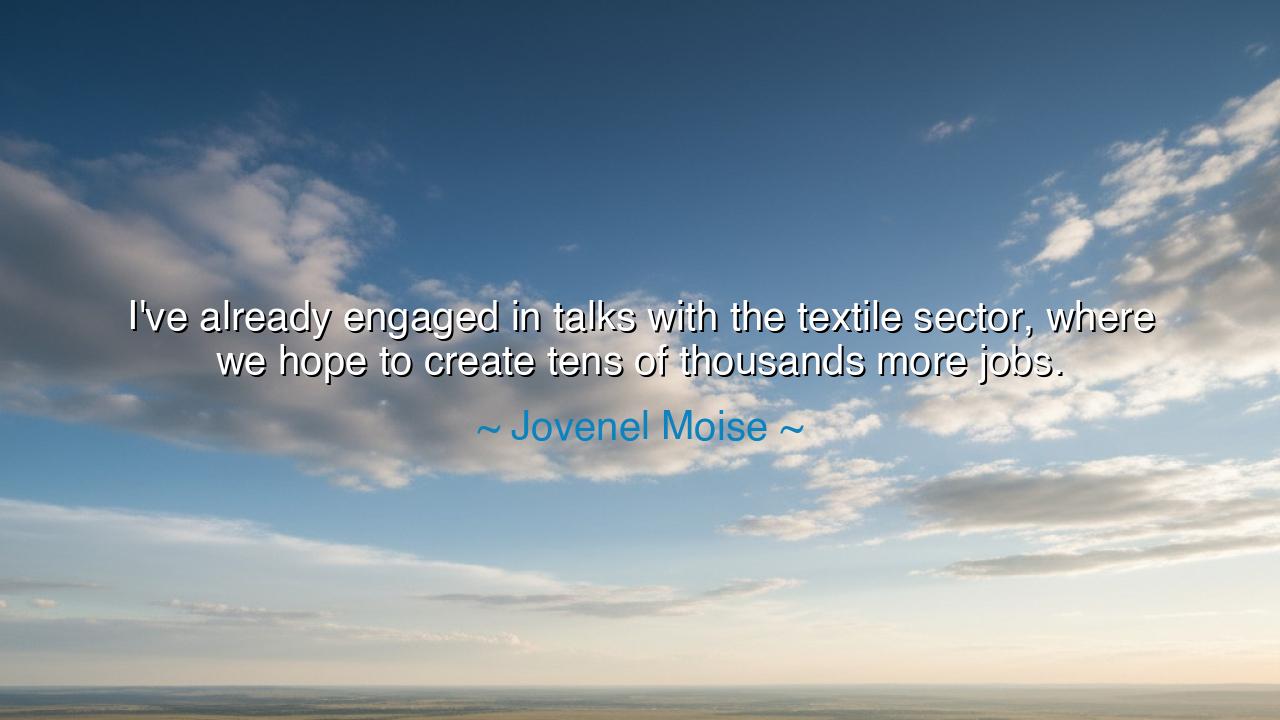
I've already engaged in talks with the textile sector, where we
I've already engaged in talks with the textile sector, where we hope to create tens of thousands more jobs.






“I've already engaged in talks with the textile sector, where we hope to create tens of thousands more jobs.” Thus spoke Jovenel Moïse, the late President of Haiti, a man whose words echoed the yearning of a nation long tested by hardship. Though seemingly a statement of policy, these words carry a deeper resonance—they are a testament to hope, to the belief that through work, industry, and unity, a people may rise from despair toward dignity. In this utterance, Moïse does not merely discuss economic reform; he invokes the ancient truth that labor is life’s renewal, and that to create work is to breathe new spirit into a struggling land.
The origin of this quote lies in Moïse’s vision to strengthen Haiti’s economic foundations by expanding the textile sector, a crucial industry for the island nation. In a land often beset by poverty and political turmoil, he saw in the hum of sewing machines and the rhythm of weaving hands a symbol of rebirth. His aim was not only to increase production but to create opportunity—to give men and women the chance to earn, to build, to dream again. For in every society, the creation of work is the creation of hope. The farmer who tills the soil, the artisan who shapes cloth, the merchant who carries goods—all partake in the sacred act of sustaining life. Moïse’s words, therefore, belong not only to Haiti but to all nations that seek renewal through honest labor.
To say “we hope to create tens of thousands more jobs” is to speak not just of numbers, but of human destinies. Each job represents a life reclaimed from despair, a child who may now eat, a home where the light burns longer at night. In ancient times, kings were measured not by their palaces but by their ability to feed their people. The wise ruler understood that prosperity shared is the root of peace, and that wealth hoarded breeds ruin. Moïse, in his pursuit of economic growth, stood upon that same ancient principle: that the greatest strength of a nation is not in its riches but in the dignity of its workers.
Consider the story of Franklin D. Roosevelt during the Great Depression of the United States. When millions were unemployed and despair hung heavy over the land, he declared, “Our greatest primary task is to put people to work.” Through the creation of jobs—building bridges, roads, and farms—he rekindled not only an economy but the spirit of a people. Work, he knew, restores more than income; it restores purpose. So too did Moïse, in his hopes for the textile industry, seek to kindle that same flame in the hearts of his people: the belief that they, through their own labor, could shape a brighter tomorrow.
There is something deeply heroic in such a vision, for to promise work is to promise dignity, and to believe in one’s people is to defy the cynicism of despair. Haiti, long burdened by natural disasters and foreign neglect, has known centuries of struggle. Yet through these trials, the Haitian spirit has remained unbroken. Moïse’s words echo the courage of that spirit—the same courage that led their ancestors to become the first Black republic in the world, freeing themselves from colonial chains. In his effort to create jobs, he sought not charity, but empowerment—a renewal of that ancient fire of independence that once shook the world.
But Moïse’s quote also carries a shadow of sorrow, for history reminds us that the path of reform is never smooth. To engage in talks is to begin the delicate work of persuasion, to bridge the divide between vision and reality. Not all will agree; not all will see. Power resists change, and progress is often slow. Yet even amid opposition, there is virtue in striving. The act of seeking improvement, however imperfect, is itself a form of leadership—for the true leader does not wait for perfect conditions but acts in faith, knowing that each effort sows seeds for those who will come after.
Thus, the lesson of Jovenel Moïse’s words is clear: to build a nation, one must first build its people. Work is the foundation of freedom, and every job created is a fortress against despair. Let each of us, in our own fields of labor, strive to bring light to others—not by words alone, but by deeds that give others the means to stand, to feed their families, and to hope again. Whether one leads a nation or a household, the sacred duty remains the same: to use one’s gifts to lift others upward.
So, my friends, remember this teaching: greatness is not measured by how high one rises, but by how many one raises with them. To create work is to create life, and to offer opportunity is to serve the divine purpose of humankind. May we all, like Moïse, be builders of hope in whatever world we touch—so that when history looks back upon our labors, it will say not only that we lived, but that we helped others to live.






AAdministratorAdministrator
Welcome, honored guests. Please leave a comment, we will respond soon